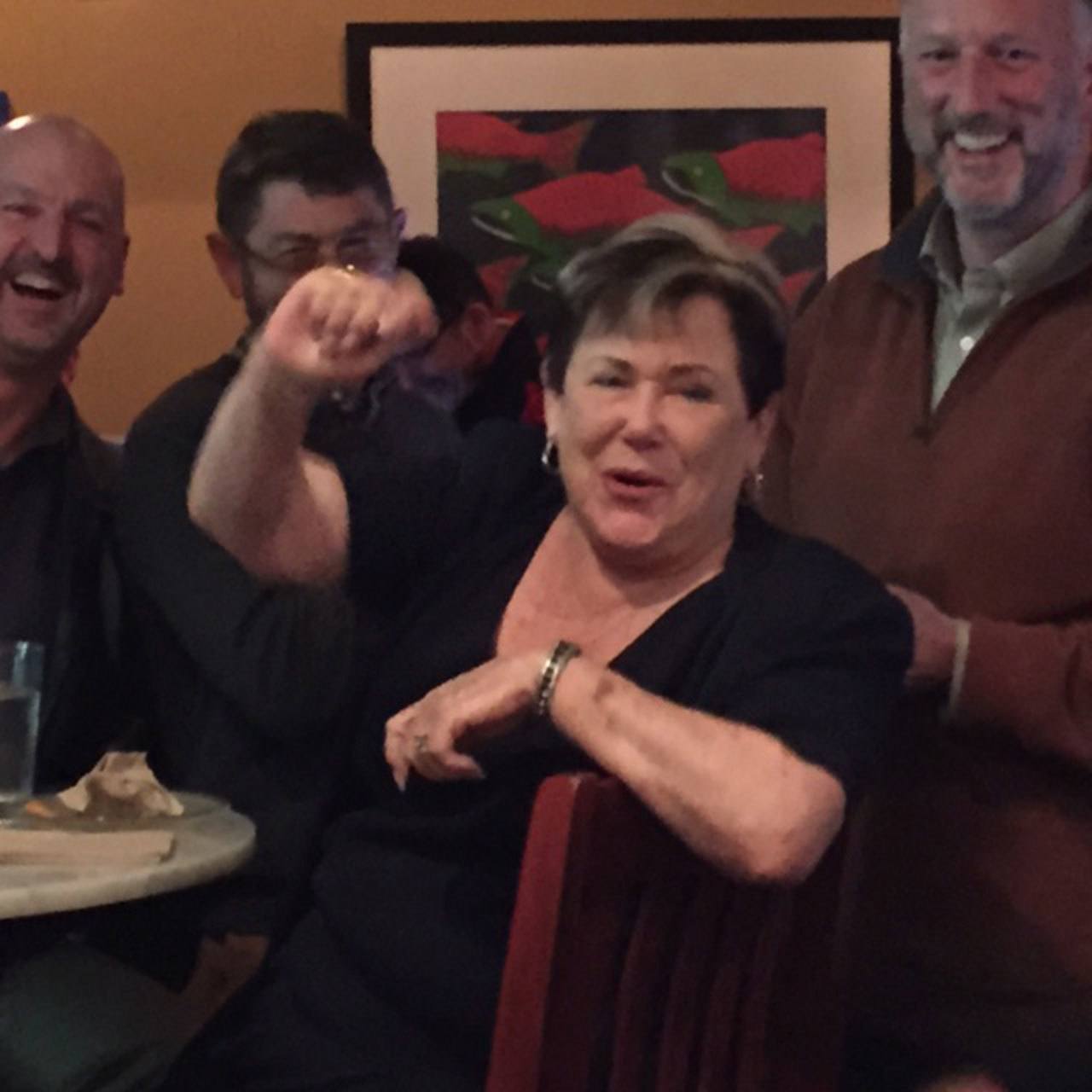POULSBO — Sherry Appleton was confident early Election Day that she would win a seventh two-year term in the state House of Representatives from the 23rd District.
But that confidence was tempered by caution.
“I hope I never take an election for granted,” she said before polls closed Nov. 8. “When you take an election for granted, sometimes you get a big surprise.”
When the first returns were posted at 8:15 p.m. Nov. 8, there were no surprises for Appleton, D-Poulsbo. Those returns showed her with 28,017 votes to Republican Loretta Byrnes’ 18,964.
Members of the state House of Representatives are elected to two-year terms and receive $45,474 a year and $120 per diem.
Appleton said she didn’t sense any great voter dissatisfaction while campaigning.
“Today, I was at a meeting with 100 women, and no one talked to me about McCleary,” she said, referring to the state Supreme Court ruling that the Legislature has failed to adequately fund basic education in accordance with the state Constitution.
“People understand we need new revenue [to do that],” she said. “We’re not going to get an income tax, so we need to do something to create a new revenue stream.”
Appleton has proposed creating new revenue by closing tax exemptions, establishing a capital gains tax, and eliminating the business and occupations tax so businesses can invest more money in growing, the thought being more business means more revenue.
“We’re not going to be able to meet the court’s decisions without extra revenue. In a sales tax-based economy, it’s just not going to happen,” she said during the campaign.
On the other hand, Byrnes said the economy is getting better so the revenue is there, pointing out that the state budget grew from $34 billion to $39 billion during the last legislative session.
“We need more efficient management and to stop wasting money on transportation projects that are not well managed,” she said at an earlier candidates’ forum. She said there needs to be better hiring of department heads, better human-resource management in state government, and more fiscal responsibility.
Appleton and Byrnes differed on other issues. Byrnes said she’s been concerned about the quality of education for a long time, but doesn’t believe the solution is more money. Education funding comprises 48 percent of the state budget, and funding is going up “dramatically” while growth in student population is not. She supports better salaries for teachers, but doesn’t support expanding education funding to include pre-kindergarten; the focus should be on K-12, she said.
Appleton said education spending has increased because of inflation, as well as teachers’ salaries and meeting the basic-education funding requirements of the McCleary decision. She supports increased funding for pre-K and community colleges.
“Quite a few studies show that children are going into first grade not ready to learn,” she said. “A lot of this [preparation] is done in pre-K … We want to make sure every kid has an opportunity to advance. Preschool and community college are part of the whole spectrum. Kids need this.”
Not every child will go to college, but they should be able to go to a vocational school where they can learn a trade, she said. “In the trades, they can make very good money. They still get an education, but it’s just [presented] to them differently.”
She added, “Running Start helps kids pay for college. It takes out those first two years. If they can graduate [from high school] with an A.A., I see that as a good thing.”
Appleton supported raising the minimum wage to $13 an hour, preferring a minimum wage of $16 an hour because that’s more of “a living wage.” Byrnes doesn’t support raising the minimum wage by initiative, but supported requiring paid sick leave. “If we force a minimum wage increase, we’re going to require [businesses] to pay more when they are already having trouble hiring,” she said during the campaign.
Byrnes said she ran for the state representative because “legislators make policy that turns into government agencies and programs, and I want to make sure they are doing what they are supposed to do. We have to hold government accountable and make sure our money is well spent. That’s not happening enough. I have the economic background and education. I’ve worked for state government — I know how it works. We need someone with a different perspective and more holistic solutions, especially with respect to education.”
Meanwhile, Appleton talked of the bills she sponsored this year: integration of treatment systems for mental health and chemical dependency; providing increased in-school guidance supports, housing stability, and identification services for students who are homeless; creating more protections for victims of sex crimes; providing court-based and school-based intervention and prevention efforts to promote attendance and reduce truancy; providing procedures for responding to reports of threatened or attempted suicide; developing a model policy on school infrastructure recovery after a natural disaster; providing for less restrictive involuntary treatment orders; and making the period of time that students are provided access to morning foods part of instructional hours if students are provided the opportunity to engage in educational activity while they eat.
She also sponsored the legislation that established Silver Alert in Washington, a public notification system in the United States to broadcast information about missing persons — especially senior citizens with Alzheimer’s disease, dementia or other mental disabilities — in order to aid in their being found.
On Election Day, Appleton said she’s in tune with what her constituents feel is important. “Most people I met said, ‘We’re voting for you,’” she said. “My stands on issues are their stands on issues.”



